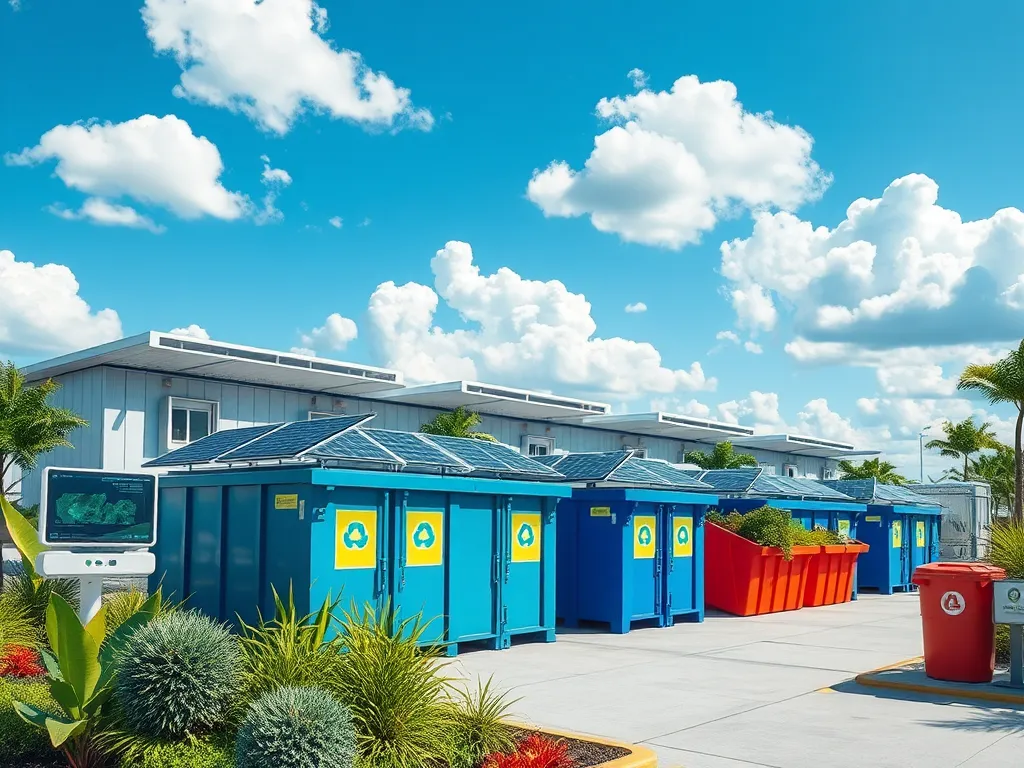Revolutionizing Waste Management: Innovations in Dumpster Rental

Innovations in Dumpster Rental and Waste Removal Technology
The waste management industry is undergoing a transformative shift thanks to technological advancements that are redefining how dumpster rental and waste removal services operate. Innovations in dumpster rental and waste removal technology are enhancing efficiency, sustainability, and user experience. From smart dumpster systems to mobile applications that streamline the rental process, the industry is adapting to meet the growing demands of consumers and regulatory bodies alike.
One of the most significant innovations in dumpster rental and waste removal technology is the integration of IoT (Internet of Things) sensors within dumpster systems. These sensors allow for real-time monitoring of waste levels, enabling service providers to optimize collection routes. This not only reduces fuel consumption but also minimizes the risk of overflows, ensuring that waste is removed before it becomes a public nuisance. Such advancements are increasingly important as cities strive to maintain cleanliness while addressing the environmental impact of waste collection.
Furthermore, remote tracking and booking features have also emerged as key components of this technological evolution. Customers can easily schedule dumpster deliveries and pickups through user-friendly applications, helping to streamline the entire process. This convenience promotes customer satisfaction and improves operational efficiency for waste management companies. As a result, innovations in dumpster rental and waste removal technology foster better industry practices and elevate user experiences.
Additionally, data analytics play a crucial role in understanding usage patterns and managing waste more effectively. This data-driven approach enables waste management companies to analyze trends, predict peak demand periods, and make informed decisions regarding dumpster sizes and types. This optimization leads to a more efficient service delivery model and aids in the development of targeted marketing strategies.
Alongside these advancements, the advent of smart compaction technology is transforming how waste is stored. Smart compactors utilize sensors to compress waste automatically, increasing storage capacity and reducing the frequency of pickups needed. This innovation not only lowers costs for service providers but also minimizes carbon footprints associated with collection vehicles, making dumpster rental solutions more environmentally friendly.
Explore the groundbreaking insights in Sustainability Innovations That Are Changing the Future of Waste to understand how we can reshape our planet.
Smart Dumpster Systems
The implementation of smart dumpster systems is one of the most groundbreaking trends in the waste management sector. Equipped with IoT sensors, these systems monitor waste levels in real-time, allowing companies to optimize collection schedules and reduce operational costs dramatically.
Moreover, remote tracking and booking features simplify the process for customers. With intuitive mobile applications, users can quickly arrange for dumpster rentals at their convenience, receive updates on collection times, and even track the truck’s location during pickups.
Data analytics contribute significantly to uncovering usage patterns, helping companies adjust services to customer needs. By analyzing data collected from smart dumpsters, waste management firms can identify trends in disposal rates and peak usage times, leading to more efficient resource allocation and improved customer service.
Smart compaction technology is another key innovation that enhances waste management efficiency. These systems compress waste, allowing more refuse to be stored in each dumpster, which reduces the frequency of pickups and overall transportation emissions, striking a balance between service cost and environmental responsibility.
Eco-Friendly Waste Solutions
As public awareness of environmental issues grows, the demand for eco-friendly waste solutions has skyrocketed. Innovations in dumpster rental and waste removal technology are embracing this trend by integrating biodegradable dumpster liners that help mitigate plastic waste and promote sustainability.
Additionally, advancements in recycling and composting technologies are helping to facilitate the separation of waste at the source. Educating consumers on proper disposal methods and providing the necessary resources for effective recycling and composting is becoming an integral part of waste management services.
Sustainable waste processing methods are also gaining traction, as companies strive to reduce landfill dependency. Innovations in waste sorting technology enable more efficient recovery of recyclables, contributing to a greener waste system.
Furthermore, partnerships with green companies are emerging as a significant trend in the industry. By collaborating with eco-conscious organizations, waste management firms can implement comprehensive sustainable practices that benefit both the environment and their bottom line.
Automation and Robotics
Automation and robotics are reshaping the landscape of waste management as companies adopt automated collection systems. These systems increase efficiency by streamlining the collection process and minimizing labor costs.
In addition to automated collection, robotic sorting technology is revolutionizing the recycling process by improving the accuracy and speed of sorting materials. Robots equipped with advanced sensors and AI capabilities can differentiate between recyclables, enhancing overall recovery rates.
Augmented reality is also finding its way into logistics planning within waste management. By overlaying digital information onto the physical world, waste management professionals can better visualize routes, optimize vehicle loadouts, and make data-driven decisions to improve service efficiency.
Moreover, drones for waste surveillance are emerging as a valuable tool in waste management. Drones equipped with cameras can monitor waste accumulation in hard-to-reach areas and assist in the tracking of illegal dumping sites, providing valuable data to service providers and regulatory bodies alike.
Mobile Apps and User Experience
Mobile applications are becoming a cornerstone in the dumpster rental and waste removal industry. App-based dumpster rental systems allow users to book rentals, schedule pickups, and manage their waste collection all from their smartphones, enhancing accessibility and convenience.
Real-time scheduling and notifications through mobile apps keep users informed about their service status. Customers can receive alerts for upcoming pickups or delays, reducing uncertainty and frustration associated with waste collection.
User-friendly interfaces are designed with the customer experience in mind, allowing users to track their waste removal easily. Features such as GPS tracking and service history contribute to a seamless user experience.
Feedback tools integrated into mobile applications encourage customers to share their experiences and suggestions. This valuable feedback helps service providers continually improve their offerings and adapt to customer needs.
Waste Reduction Technologies
Innovations in waste reduction technologies are crucial for promoting sustainability within the industry. On-site waste conversion systems, for example, allow businesses and households to process their organic waste into compost or energy, reducing the amount of refuse sent to landfills.
Innovations in material recovery facilities are enhancing the separation and processing of recyclables, boosting overall recovery rates and minimizing the environmental impact of waste disposal.
Waste-to-energy technologies are also gaining popularity, as they allow for the conversion of non-recyclable waste into energy, providing an alternative energy source while reducing landfill reliance.
Circular economy initiatives are being adopted by waste management companies to promote a more sustainable approach to waste. By focusing on reducing waste generation and promoting reuse, the industry can transition towards more sustainable waste handling practices.
